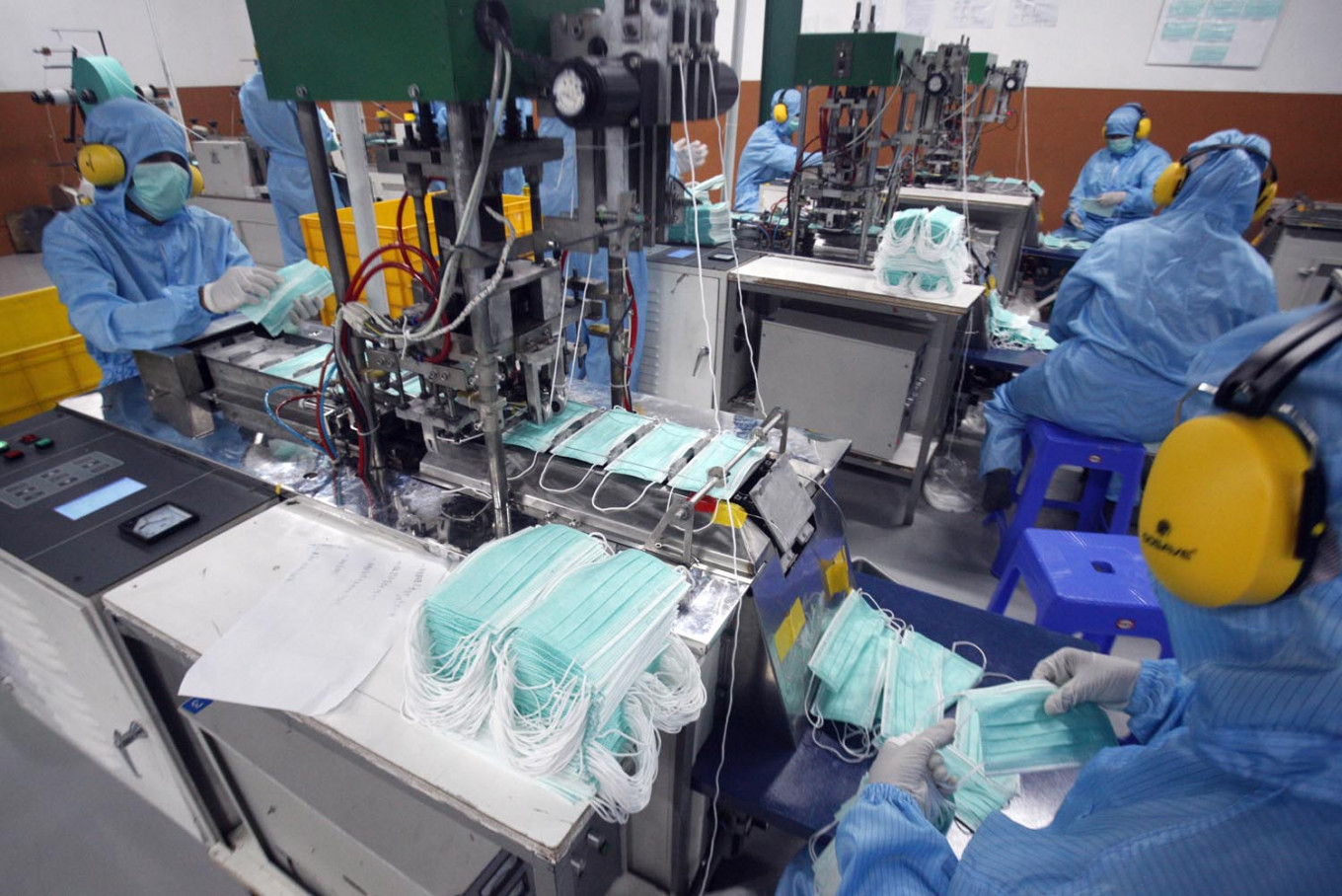Indonesian manufacturers not out of the woods despite improvement
Change Size
 Workers make medical face masks at a factory owned by PT Multi One Plus in Bogor, West Java, on April 15. Indonesia’s manufacturing industry has yet to recover despite an improvement in July. (Antara/Yulius Satria Wijaya)
Workers make medical face masks at a factory owned by PT Multi One Plus in Bogor, West Java, on April 15. Indonesia’s manufacturing industry has yet to recover despite an improvement in July. (Antara/Yulius Satria Wijaya)
D
espite improvement in July, Indonesia’s manufacturing industry has yet to recover from the deep downturn earlier this year, as domestic consumption remains weak, economists and businesspeople have said.
IHS Markit’s Manufacturing Purchasing Managers’ Index (PMI) for Indonesia, a gauge of the country’s manufacturing activities, climbed by almost eight points from 39.1 in June to 46.9 in July, the highest reading since February.
A value above 50 indicates an expansion against the previous month, while a reading below 50 indicates a contraction.
The country also recorded a slower drop in new orders and output amid the gradual reopening of the economy.
“PMI data showed another marked easing in the downturn across Indonesia’s manufacturing sector in July, adding to hopes that the worst impact of the COVID-19 pandemic was felt in the second quarter,” IHS Markit head economist Bernard Aw said in a statement on Monday.
Earlier this year, the index recorded its worst decline in the survey’s nine-year history and the steepest drop recorded in Asia when it fell to 27.7 in April from 45.3 in March. Analysts said the government’s COVID-19 containment measures were the cause behind the downfall, as they forced factories to shut and caused unemployment to grow.
The country has since taken steps to kickstart the economy. In June, the central government and local administrations were seen gradually easing large-scale social restrictions (PSBB).
“Output, orders and employment indices all lifted from the lows seen in the second quarter, helped by a relaxation of the COVID-19 containment measures. Companies also remained optimistic about their output in a year’s time,” Aw said.
The IHS Markit report states that almost two-thirds of its survey respondents expected a rise in output over the next 12 months.
However, a sustained gain in the country’s PMI is still in question, economists have noted.
Aw explained that the need for ongoing social distancing at workplaces and public gatherings, as well as any potential surge in new infections, could further delay output and sales from recovering to prepandemic levels.
On Tuesday, Indonesia confirmed 1,922 new COVID-19 cases, bringing the number of infections to 115,056 nationwide, with more than 5,300 deaths, official data show. The country surpassed the 100,000 figure on July 27 following the gradual reopening of the economy.
The recovery in the country’s PMI has also been slower than in neighboring countries that have recorded an expansion in recent months. Malaysia booked 50 in its July’s PMI and 51.0 in June. Vietnam booked 47.6 in July, following 51.1 in June.
Even as Mirae Asset Sekuritas Indonesia economist Anthony Kevin projected an expansion in the manufacturing activity in this year’s third quarter, he was of the view that it could still be followed by a contraction in September and onwards, indicating high volatility.
He concluded from first-hand observation that purchasing power among middle-to-low-income earners had yet to return, sustaining the pressure on the manufacturing industry.
“The middle-low income segment accounts for more than 50 percent of Indonesia’s economy, and they have a higher marginal propensity to consume, making them indispensable to economic recovery,” he said on Monday.
The slow disbursement of the government's social safety aid had prevented a strengthening of purchasing power, he added.
“In conclusion so far, looking at the latest IHS Markit survey, there is a chance that our full-year gross domestic product (GDP) will contract,” Anthony said.
The government projects the country’s economy to grow by 1 percent this year at best or contract by 0.4 percent at worst as the outbreak paralyzes economic activity.
The economy only grew by 2.97 percent in the first quarter, the slowest rate in 19 years, while household spending growth fell to 2.84 percent from around 5 percent a year earlier. It is projected to contract by 3.8 percent to 5.1 percent in the second quarter and possibly enter a recession in the third quarter.
Shinta Kamdani, the deputy chairwoman of the Indonesian Chamber of Commerce and Industry (Kadin), said many manufacturers continued to operate at a loss, albeit at a smaller margin, as overhead costs still exceeded revenue.
Consumption growth was far too slow, Shinta said, sustaining depressed domestic and international markets while making manufacturers reluctant to increase productivity.
“If under these conditions the national manufacturing industry produces with a higher level of productivity than the rate of the increase in market demand or market consumption, the price of manufactured products will fall further and the losses on the manufacturers’ side could rise,” she wrote in a text message on Monday.
“Therefore, the PMI is also held back until there is a more significant increase in consumption or market demand”.









